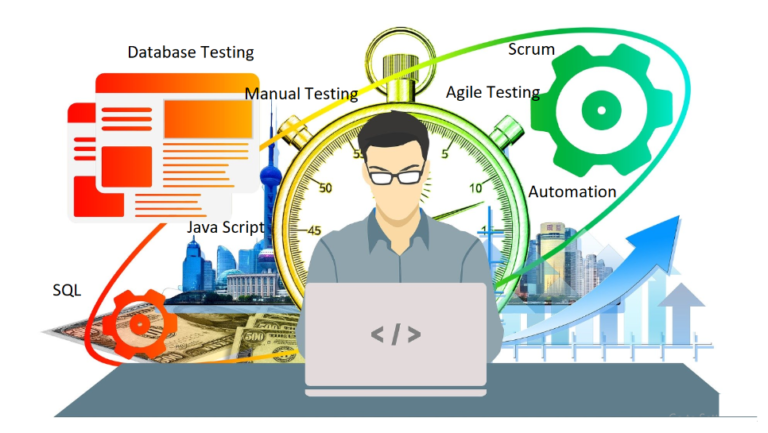Manual Software Testing (QA)
Welcome to Infinity Tech Pro’s Manual Software Testing (QA) Course – a comprehensive program designed to provide you with the foundational skills and best practices for ensuring the quality and reliability of software applications through manual testing. Whether you’re a beginner in the field of software testing or an IT professional looking to enhance your testing skills, this course covers key aspects of manual testing to equip you with the knowledge needed for successful software quality assurance.

Introduction to Software Testing:
- Gain an understanding of the fundamental concepts of software testing, its importance, and its role in the software development life cycle.
Testing Techniques and Levels:
- Explore various testing techniques and levels, including unit testing, integration testing, system testing, and acceptance testing.
Test Planning and Documentation:
- Learn how to create comprehensive test plans, test cases, and other documentation essential for effective testing processes.
Test Execution and Reporting:
- Understand the process of executing test cases, reporting defects, and collaborating with development teams for issue resolution.
Regression Testing:
- Dive into regression testing, ensuring that new code changes do not negatively impact existing functionalities.
Black Box and White Box Testing:
- Explore both black box and white box testing techniques, covering functional and structural aspects of testing.
Defect Life Cycle and Tracking:
- Learn about the defect life cycle, tracking defects from identification to resolution, and communicating effectively with the development team.
User Acceptance Testing (UAT):
- Understand the principles of User Acceptance Testing (UAT) and how to involve end-users in the testing process.
Quality Assurance Best Practices:
- Gain insights into quality assurance best practices, ensuring that testing processes align with industry standards.
Real-world Testing Scenarios:
- Apply your skills to real-world testing scenarios, simulating the challenges and complexities encountered in practical software testing projects.
Introduction to Software Testing Mastery:
- Gain an understanding of the fundamental concepts of software testing, mastering its importance and role in the software development life cycle.
Testing Techniques and Levels Proficiency:
- Explore various testing techniques and levels, becoming proficient in unit testing, integration testing, system testing, and acceptance testing.
Test Planning and Documentation Skills:
- Learn how to create comprehensive test plans, test cases, and other documentation, becoming proficient in essential testing processes.
Test Execution and Reporting Expertise:
- Understand the process of executing test cases, reporting defects, and collaborating with development teams for issue resolution.
Regression Testing Proficiency:
- Dive into regression testing, becoming proficient in ensuring that new code changes do not negatively impact existing functionalities.
Black Box and White Box Testing Skills:
- Explore both black box and white box testing techniques, becoming proficient in covering functional and structural aspects of testing.
Defect Life Cycle and Tracking Mastery:
- Learn about the defect life cycle, becoming proficient in tracking defects from identification to resolution and communicating effectively with the development team.
User Acceptance Testing (UAT) Proficiency:
- Understand the principles of User Acceptance Testing (UAT), becoming proficient in involving end-users in the testing process.
Quality Assurance Best Practices Mastery:
- Gain insights into quality assurance best practices, becoming proficient in ensuring that testing processes align with industry standards.
Real-world Testing Scenarios Application:
- Apply your skills to real-world testing scenarios, becoming proficient in simulating the challenges and complexities encountered in practical software testing projects.
The Manual Software Testing (QA) Course by Infinity Tech Pro is designed to be completed within an estimated timeframe of 6 to 8 weeks.
Participants are recommended to allocate approximately 5 to 7 hours per week to the course. This duration allows for in-depth exploration of each module, hands-on testing exercises, and a comprehensive understanding of manual software testing concepts and techniques.
The course duration is structured to cater to beginners in the field of software testing or IT professionals looking to enhance their manual testing skills.
Flexible class timings !!!
Ask at your Point of Sale for a particular time when your are willing to attend the class.
Price Will Be Depends upon Your choosen Course and it will the Best in the Market.
